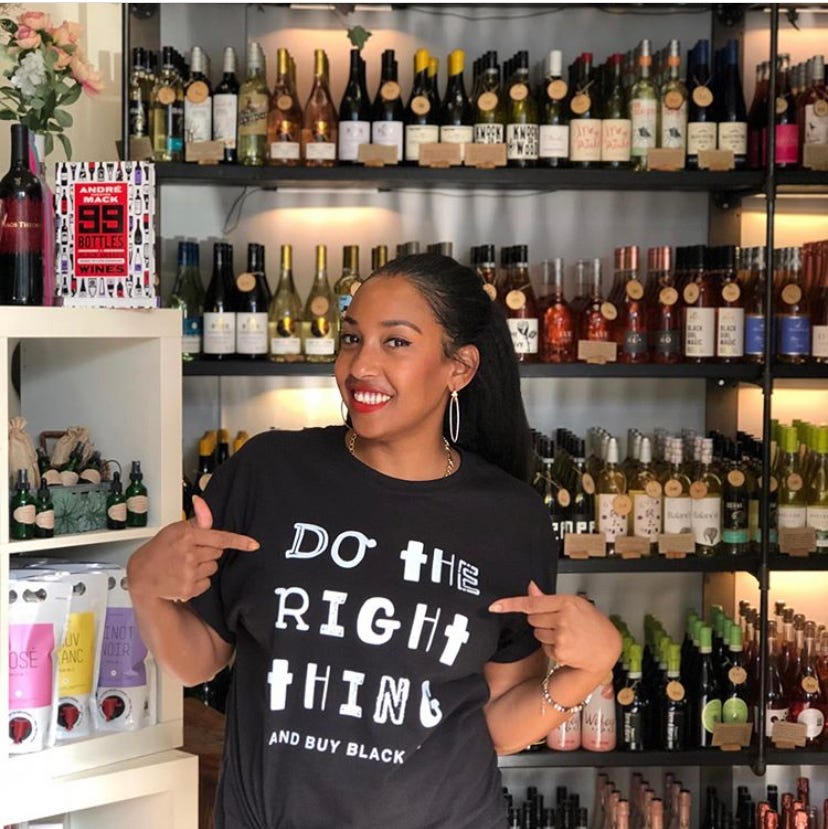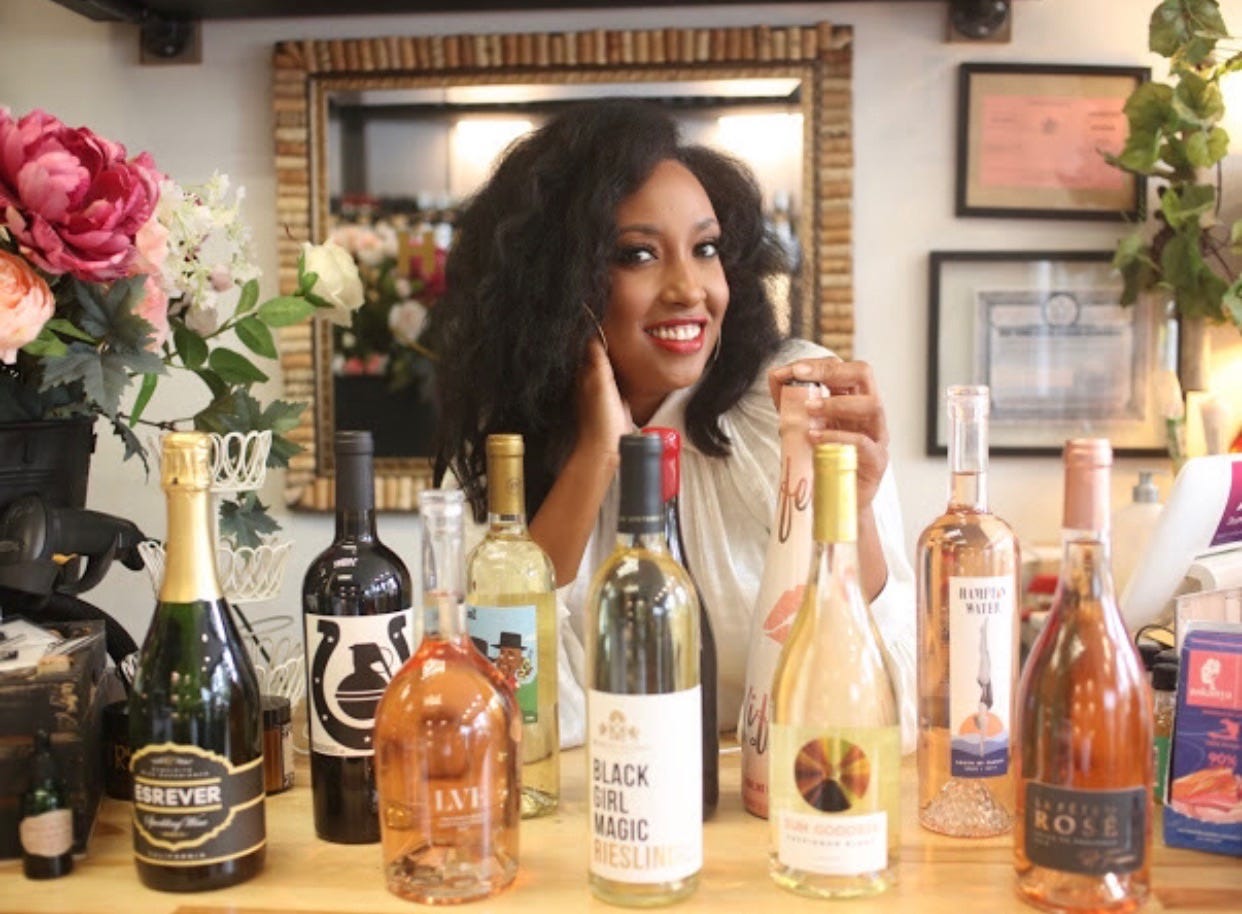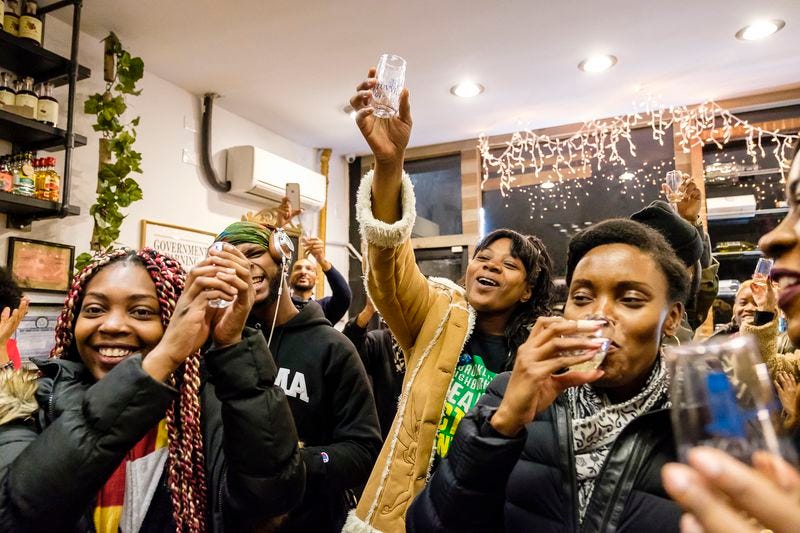The Fizz #14: Sunshine Foss is matching minority owned wineries to distributors, opening up channels of communication for wine brands
Sunshine, owner of Happy Cork, and I speak about her mission of getting minority wine brands on the shelves of stores across the country, and the tribulations they face along the way.
For The Fizz #14, I got to speak with Sunshine Foss, founder and owner of Happy Cork, a bottle shop in Brooklyn, NY focused on amplifying minority-owned wine brands and building local community. Sunshine’s sharp focus is on making sure winemakers are able to access distribution, avenues for sales and marketing, and connections that will help them succeed in the industry. In talking with her for this issue, it’s clear that Sunshine is doing some of the most important and most direct wine industry work in the United States right now.
In this conversation, we spoke about how Happy Cork was built for Sunshine’s local Brooklyn community, how education has helped bring people together around Happy Cork, and the issues that many minority owned wineries face when trying to get their products out to market. I hope you enjoy this meaningful conversation, and bring your full support behind this change-maker.

Margot: How did Happy Cork come together, how’d you get started?
Sunshine: A lot of people go into a wine store like this is their dream or their mission, but Happy Cork actually found me. I bought the building in 2016, and there was a liquor store there. It was your typical bullet-proof glass liquor store, they had maybe five bottles on the shelf. Months into us purchasing the place, they defaulted and never paid us. It took a while to rent the space—when a lot of people see Happy Cork now, they think we’re in the perfect location. It wasn’t that then, we’re on a side street in between [the high-traffic] Atlantic Avenue and a residential area. A lot of the people we were trying to rent to didn’t want it because there wasn’t foot traffic. Finally, I said if it’s not rented by 2018, I’m going to do something here.
A lot of times spaces open up and it is intimidating for the residents in the neighborhood. I wanted to create a space where the community could feel welcome—more of an experience than your typical wine store. I wanted it to be a beautiful space. I started the process of getting the permits together. Once I said I’m going to call it Happy Cork, it just became a happy space. Prior to launching a store in New York, you have to get the community on board. We had to canvass the neighborhood, get petitions signed. The community was completely behind us, so from that point on I knew that this was going to be for them.
It was on the job training once we got the permit—trying to taste different wines. I thought, well, I’d love to find out more about minority-owned wineries. In my liquor license, I actually stated that I wanted to focus on minority owned and female owned brands that weren’t typically out there. When I started asking for these bottles from distributors, everyone came up short. That birthed me making it my mission to find these brands and get them on the shelves. That’s why when I say community is at the heart of this, it really is! These brands have become family, they’re a part of Happy Cork. We rely so much on these brands, as they rely on us. We get to know the brands, we have the customers know the brands. It’s a community effort.

M: I know that distribution of Black and minority-owned brands is a major blocker for those brands breaking into the industry. What are some of the ways you’ve worked with distributors or producers to get the wines you’re excited about on your shelves?
S: I work backwards a lot of the times. A lot of people go to distributors and say I want this type of wine. I find the brands first, find out if they have distribution, which a lot of times they don’t. I’ll connect brands to distribution, giving them details, setting them up on different distribution sites. I’ve had wine brands connect with vineyards to have their wines made. A lot of people think it’s just “oh cool, you have these brands”, but the work that goes into it is crazy. I’ll stalk brands on Instagram and send emails and ask them where they are in terms of distribution. I will follow up! I’m the follow up queen! I’ll follow up until you are in the store [laughs].
I spoke to someone yesterday—he’s been in the business for 11 years and has never been in the New York market. For him, he’s tried several times to get in, but distributors have basically told him no, we don’t want your wines. I think for a lot of these brands, they’re hitting roadblocks or not thinking that their product can make it in the New York market because of past pushback. Now I’m seeing such a big push by sales reps and distributors to represent a lot of these brands because they’re seeing that there’s money there. But also, these are some of the most amazing wines and spirits you’ll try—why shouldn’t they have distribution?
I’ll buy up front so they can get their products in the store. I’ve brought in drop-ins, I’ve worked with distributors to say hey you don’t have to carry this in your portfolio, but you can certainly give me one drop. In New York state, I have to buy through distribution—I’ll take ten, twenty cases just so I can have them in the store.
M: You’re doing such important work opening up these avenues and creating these personal connections. It sounds like a lot of these producers don’t have a lot of resources to navigate this distribution web.
S: It works two ways—you speak to a lot of these winemakers, and it’s like talking to an artist. There is such a creative side to these winemakers who are so passionate about what they’re doing. The business side may not be their strong suit, though. We just did a tasting with Theopolis Vineyards, and Theodora, who is absolutely amazing, she broke down the fact that she’s coming from a law background. She’s working full time doing law, making these wines, it’s a one woman show, and you’re also expected to have the sales side down as well. It’s hard for a lot of winemakers because they’re not sales reps—they’re not in the business of making money. They don’t have the resources to know next steps. That comes with educating.
When some of these brands [who may have been in the business for years] reach out to distribution, they just get shut down immediately, and no-one offers any resources or next steps. Folks just sell their cases online, not even thinking about salespeople or distribution. That’s a tough task to navigate, though. It boils back down to educating and getting some resources out there for these winemakers. With Theodora, she is working with the African American Vintners Association, for example. They’re trying to educate the community around buying land, doing surveys, growing grapes, all the nitty gritty that goes behind wanting to start your own wine brands. There’s the grower side, the winemaker side, but what’s the next step after that? Finding more people to educate winemakers would be super helpful.

M: It sounds like there’s a big opportunity here for education.
S: There’s a huge opportunity! So many people DM me with questions about owning brands and what the steps are, and how to get the wine on shelves. It’s literally just me giving advice, setting up calls, connecting people. If there were public resources, that would be amazing, but that doesn’t exist yet. There are people like The Roots Fund and Hue Society and newer spaces doing scholarships for becoming a sommelier or learning how to be a winemaker. It’s starting, but there should be more on the sales side of it.
M: That’s really insightful. How do you think about education, and involving the community in your work?
S: Going back to the start of Happy Cork, the community was instrumental in us even opening. People would walk by and say wow I can’t wait until you all open, and there was this excitement building. Prior to COVID, we hosted tastings every Wednesday and Friday. We opened our doors and it was crickets [laughs]. No-one came in. People would walk by and we’d wave, and there was no-one. I think I realized after speaking to a couple of people who did come in—Happy Cork is such a beautiful space, that a lot of people, when they see it, they thought it was too beautiful. People would come in and say “wow this is beautiful, and it’s Black owned? I didn’t think it was for us. You’d never think it would be in this neighborhood”. I just thought why would something this beautiful not be for us?
You don’t find spaces where you can come in and feel so welcome. There’s nothing like a place that was built for you and with you in mind, rather than a space where you’re just welcome. Even for me, when I was doing market research, I used spaces I could easily go into. The reception that I got, I asked a couple of questions, and it felt kind of like hurry up and leave. It did not feel like they wanted me to be there. You want me to spend my money here, but you’re not giving me any sort of warmth. I knew this space had to be different. All that goes back to education—wine, especially in urban communities, was not seen as accessible. It was for the elite, it was for people who had a lot of money. Liquor stores that were in this neighborhood, it’s bullet proof glass and Moscato. It really shows that we need to pay attention to these people who want to learn more about wine.
The education side of Happy Cork is huge for us. We taste everything that comes into the store, I make sure the team gets to try everything. It rolls off of your tongue when you can explain to people the history, the background of the brands. That’s why we are so close to the brands—I have a conversation with them about how they got started, the story behind it, why they’re doing it. We get to pass that on to the customer, and it makes them feel good that they can come in and we can have an hour long conversation with them if they want to. You have people who come in here and say “I’ve never tried a red wine”. Those same people are coming in now saying “oh I’ve tried this and that and this”. It’s a space that makes you feel comfortable enough to ask questions and find out more about the different wines in the space.
For our weekly tastings that we used to have, people would come dressed up on a Wednesday and a Friday. They’d do the tasting, get their bottle, go to dinner. We’ve even had hookups here at our tastings! People that were neighbors but never knew each other would come in and meet and become friends. People now are coming from all over for the Happy Cork experience.

M: Wow, that’s so special. I love that neighbor story—especially in New York, that’s rare.
S: Yes! We have so many people packed into one space, and none of them know each other. It’s super special.
M: You’re doing a lot of external wine education as well, virtually. What’s the vision for that?
S: I think a lot of what Happy Cork has done is to pivot. We’re figuring out how we can best reach people since we’re not able to reach them in person. A lot of what’s happening is organic, where we’ve taken our in store tastings and gone virtual. When we did in-person tastings, we’d have the brands come in and speak about the wines, which gave customers an opportunity to get to know the different winemakers. We wanted to make sure that same experience could be carried through virtually. We’re working with The Roots Fund and Urban Connoisseurs to take part in their events and get the word out about a lot of these underserved brands. Because we’re able to do shipping and delivery, our reach is wider. We’re trying to spread the word as much as possible using social media, but it’s continuing to build on that educational aspect to Happy Cork.
M: Running a wine shop is not an easy job—can you tell me where you find your joy in the work that you do?
S: I think my joy is when I see the reception of Happy Cork and what we’re doing. A lot of people ask if we have PR, but we have absolutely none of that. I don’t reach out to anyone. We’re so dependent on the people coming into the store—those are the people reposting us and sharing our stories and telling their friends to check us out. We’ve been able to see so many new people come in. We’re making an impact. What we’re doing is disrupting this industry, which has been typically a white male dominated industry. People are taking notice of it.
What brings me joy is seeing that these brands, that I’ve brought in here that were pretty much exclusive to us because no-one was giving them the time of day, and now I’m seeing they’re getting coverage or distribution in other states. Seeing those brands blow up brings me so much joy. It’s really family—like seeing your sister or brother grow.
M: That’s such important work you’re doing, and so impactful.
S: We’re pushing! When I started, we had one minority owned brand on the shelf. Now, I can say that we have almost all of our shelves filled with minority owned brands. I would literally ask distributors hey do you have female owned brands, and they wouldn’t even know! Now there’s a big focus on these brands. Seeing that means we’re doing something right.
M: Thank you so much for your time. I can’t wait to come down and visit!
————
You can learn more about Happy Cork in this interview by Black Owned Brooklyn. Support them by buying directly in-store or on their website, and amplifying them on Instagram.
BIG NEWS! I’m opening a wine shop this summer! American Fizz will focus on wines and ciders made locally. I’d love your support—you can read more about my mission on my GoFundMe.



